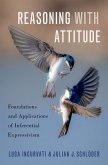This is an open access title available under the terms of a CC BY-NC-ND 4.0 license. It is free to read at Oxford Academic and offered as a free PDF download from OUP and selected open access locations. Certain combinations of sounds or signs on paper are meaningful. What makes it the case that, unlike most combinations of sounds or signs, they have meaning? What is this meaning that they have? And what is it to understand this meaning? This book advances new answers to these questions by developing inferential expressivism, a novel approach to the study of meaning which combines elements of the expressivist and inferentialist programs. Expressivists explain the meaning of words in terms of the attitudes that words are used to express; inferentialists explain the meaning of words in terms of the inferences that words are used to draw. Reasoning with Attitude lays out the foundations of inferential expressivism by defending the view that the meaning of an expression is to be explained in terms of the inferences we draw involving the attitudes we express. As the book shows, by joining forces, expressivism and inferentialism can meet their key challenges whilst retaining their distinctive insights and advantages. Notably, inferential expressivism solves the Frege-Geach Problem plaguing expressivism, and addresses the charge that inferentialism has limited applicability. The book demonstrates the fruitfulness of the inferential expressivist approach by applying it to several open questions in semantics from different areas of inquiry, including epistemic operators and conditionals in the philosophy of language, negation and the truth predicate in the philosophy of logic, and normative vocabulary in meta-ethics.
Dieser Download kann aus rechtlichen Gründen nur mit Rechnungsadresse in A, B, BG, CY, CZ, D, DK, EW, E, FIN, F, GR, HR, H, IRL, I, LT, L, LR, M, NL, PL, P, R, S, SLO, SK ausgeliefert werden.









